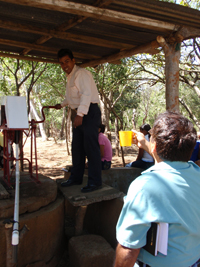The road to El Ingenio is not smooth.
To get to the small community, near the city of Jinotepe in southwestern Nicaragua, visitors have to navigate bumpy, unpaved roads that are almost overcome with trenches and holes. Driving on the roads is not easy, and traveling by foot can mean an arduous and time-consuming journey.
But for the people of El Ingenio, such a trek was a daily necessity. Until about three months ago, residents had to walk two kilometers to get water from a river every day.
But now, thanks to the Evangelical Council for Aid to Development (el Consejo Evangélico Pro-Ayuda a Desarrollo, or CEPAD), water is available right in the center of the village.
CEPAD provided a new pump for El Ingenio’s well, which had fallen into disrepair. CEPAD is a partner of the Presbyterian Church (U.S.A.), and several PC (USA) mission co-workers serve with CEPAD. Founded in 1972 after an earthquake that devastated Nicaragua’s capital city of Managua, CEPAD is a Christian, non-profit, non-partisan social agency that promotes justice, peace and solidarity in poor communities.
The people of El Ingenio said one of their biggest challenges is working together as a community. Douglas, a Nazarene pastor in the community, is working to bring people together through theology, environmental and self-esteem classes. The well has also been a unifying force, as residents work together to maintain it. And the community is looking forward: residents want to dig two more wells if they can secure funding.
That sense of hope and progress is one of the things CEPAD cultivates. It manages nine programs for the people of Nicaragua, focusing on 43 small communities. CEPAD staffers work to motivate and train people to defend their human rights through programs like environmental management, women’s development and theological education.
Empowering farmers to protect their resources is a major focus of the environmental programs. CEPAD trains people in ways to manage their crops and use the land in a sustainable way. These farmers are then able to teach their new skills to others in their communities.
One such conservation project is in Cañas Blancas, also near Jinotepe. In this garden, a farmer has arranged her crops so that the land has a greater capacity. She has planted banana trees, whose large leaves provide shade for smaller plants, like beans. Before working with CEPAD, she only planted plantains, but her garden now boasts cucumbers, melons, tomatoes, squash, oranges, lemons and flowers. She has also dug trenches to provide irrigation and prevent flooding when it rains.This garden in Cañas Blancas has grown to include more plants during the past year.
The soil quality in the garden isn’t great, but the use of organic fertilizer made from her crops has improved conditions in the past year. She sometimes produces a surplus of food, which she then shares with community members or sells in town.
Like many Nicaraguan men, the farmer’s husband lives in Costa Rica, where he was able to find work. She has two small children and uses the garden to provide for them.
Community empowerment and solidarity is a key goal of CEPAD, which aims to stay in communities only a short time before moving on and leaving residents to manage the programs for themselves. Another goal is the development of women — CEPAD has a rule stating that projects’ boards of directors must be at least 30 percent women.Daniel, a community leader in the community of La Pita, explains several of the programs being established there.
The sense of female strength was evident in the community of La Pita, near Jinotepe. There, in addition to a farming project, women are involved in a psychosocial program. The program focuses on family problems, including drug additions and domestic violence and abuse, which is a big problem in Nicaragua.
This program is hard work, the women said, adding that they sometimes want to give up and seek spiritual help in hard times. But they have reached out to many people in their community and have been able to help two people. Family problems can happen to anyone at any age and are sometimes hard to talk about, the women said.

